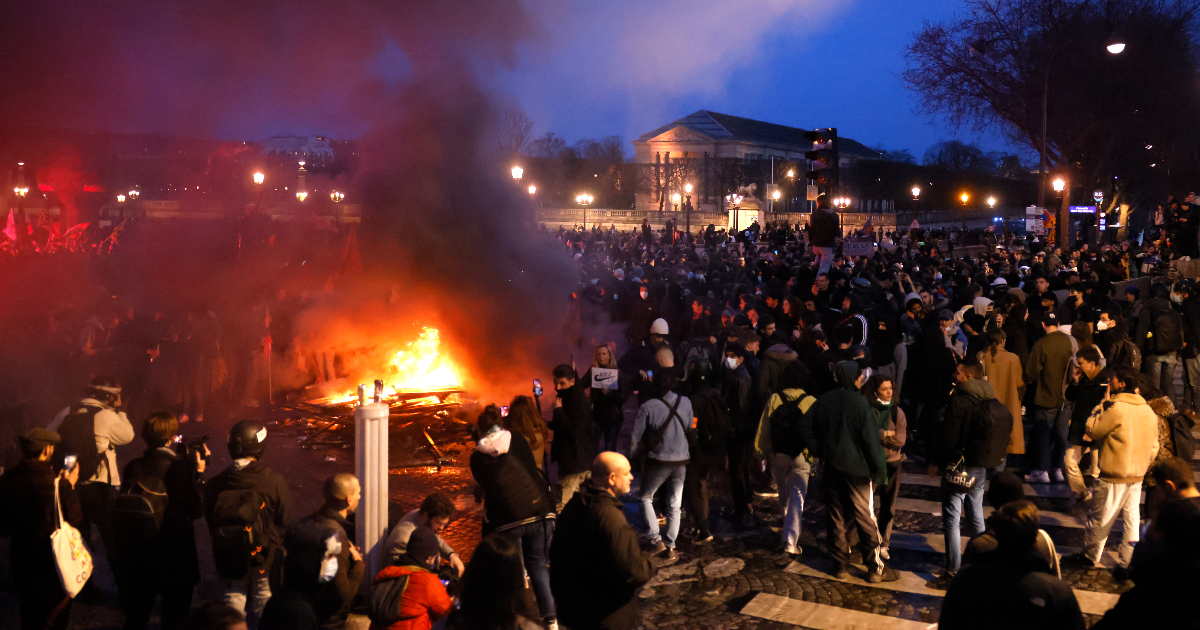The highly contested pension reform in France, which raises the minimum retirement age from 62 to 64, passes without a vote in Parliament. The government of Emmanuel Macron approved the provision by having it activated, through the prime minister Elisabeth Bornethe mechanism provided for by the article 49.3 of the Constitution. After the green light from the Senate, it was not necessary to obtain the approval of the deputies as well. The choice came in a climate of high tension inside and outside the Chamber: while the unions and demonstrators announce their intention to strike to the bitter end, the deputies of the opposition they intoned the Marseillaise (video) and prevented the premier from speaking for a few minutes. “I take responsibility for my government,” Borne said later, as she was booed. A little later thousands of people flocked to Place de la Concorde for an impromptu sit-in, with the presence of trade unions but also of various leaders of the “yellow vests”: the forces of order carried out a series of charges and used tear gas e fire hydrants to disperse the protesters. In the evening the situation deteriorated further. After an attempt to clear the police with water cannons, groups of demonstrators returned to the attack, devastating and setting fire to various materials and vehicles, clashing with the agents. Numerous damages in the nearby, elegant Faubourg Saint-Honoré. The arrested are at least 120. After the parliamentary blitz, the coordination of French trade unions announced a “una new national mobilization” against the reform for Thursday 23 March: “Instead of withdrawing the bill, the government has decided to force it through”, denounce the acronyms in a note.
“Until the last minute, with our ministers, we made every effort to assemble a majority on this text. We wanted to vote,” Borne said on national television in the evening. But it was not possible, he explained, due to “some people who wanted to make a personal game in contradiction with their group”: the reference is to the deputies of the Républicains who intended to vote against the reform, disobeying the indications of the party. At that point, she went back over, “it was found that there were no more votes” and she took “a collective decision“, “noting that we could not play the future” relying on “possible changes in the position of opposition deputies. The challenge is to ensure a future for our pension system,” she claimed. “I am well aware that it is an important effort for the French to work for another two years. It may be that someone wanted to make people believe that everything can be paid for by borrowing, but it is not serious”. The prime minister then said “shocked” from the protests in the Chamber: “Parliament, the National Assembly, is the place for debate. If you don’t want to listen to each other, it means that some parties don’t respect our institutions”.
However, that’s not all for the government: in the next 24 hours, the opposition will have the right to present motions of censure. The services ofNational Assembly have already let it be known that the vote on the motions – which will be “transversal”, given that Marine Le Pen has already announced that she will also vote on the motions of the left – is scheduled for Monday. The government has little chance of being defeated on confidence, unless Republican or centrist deputies also vote against the government. According to the latest statements by the French parties, they would be three motions in preparation: one from Nupes, New People’s Ecological and Social Uniona coalition of French political parties founded by left-wing and ecological movements, one already officially announced by the National Gathering and a third, from several parties, which could be signed by the group Liberties, Independents Overseas and Territories (Liot), which has 20 deputies and by the deputies of Les Républicains. Nupes deputies could also participate but not from La France Insoumise di Jean-Luc Melenchon. This last motion appears to be the only one capable of gaining momentum the 289 votes needed to pass. If that were to happen, the government of Elisabeth Borne would be overthrown. Macron would then have the choice of reappointing you to form a new government or choose another prime minister or even dissolve the National Assembly.
Only once in the history of Fifth Republic in France, a government fell following a motion to censure the opposition, a tool used a hundred times. It happened in October 1962 with Charles de Gaulle President of the Republic. The resignation of the Pompidou government followed, and the response from General de Gaulle was the dissolution of Parliament. The motion of censure concerned de Gaulle’s intention to reform the presidential election and to transform it from a vote of “big voters” to a vote by universal suffrage capable of guaranteeing him greater legitimacy in a period of serious political instability.
